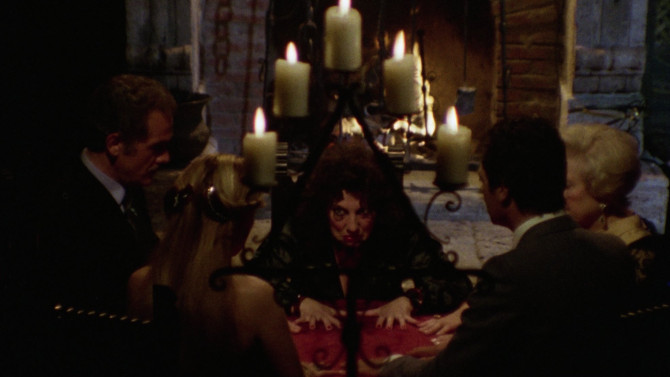
What Could Have Been: Malabimba
Like The Exorcist hopped up on a lethal combination of steroids and Viagra, 1979's Malabimba, directed by envelope pushing Andrea Bianchi (for a reminder of his more well known work, think of his playfully edgy 1975 giallo Strip Nude for Your Killer), is an Italian motion picture not for the faint of heart. . . or you, like one of the characters in the film, might find yourself stone cold. Of course, reading this, I’m sure most will think that this is some sort of poorly done, sleazy exploitation piece attempting to capitalize on the aforementioned horror classic. And though the second sentiment is wholly true, the former is most definitely not so.
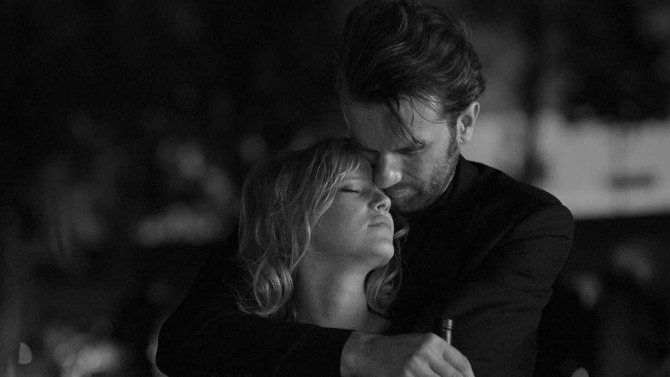
Some Like It Cold
It is likely that any other year, outside of 2018, would have meant that a second one of Pawel Pawlikowski’s films would have won Best Foreign Language Film at the Academy Awards (the other is 2013's Ida). Instead, Alfonso Cuarón’s Roma (in its own right, a truly visionary film) froze out Cold War. Though this Polish export did achieve a nomination in the above mentioned category, as well as receive nods for Best Achievement in Directing and Best Achievement in Cinematography, it, in many ways, got overshadowed by another black and white foreign film released the exact same year. . . which is truly a shame. Set in post-war Poland – 1949, to be exact, Wiktor (Tomasz Kot), a very bourgeoisie musician (a dynamo who can play the piano, as well as write and arrange music) – bold, confident, and gifted, tours the countryside, recruiting the most talented teens and twenty somethings for a folk music ensemble that will tour Poland and the rest of the Eastern Bloc. One of the finds, Zula (Joanna Kulig), an undaunted singer, may not be the most pure talent, though she has that certain ‘je ne sais quoi’. With a mystifying persona, she is spark plug, femme fatale (both director and actress inspired by Lauren Bacall and her sarcastic delivery), and, somehow, ingénue. Wiktor has found his muse. . . love at first sight. . . the genesis of a change that you can never return from. A love affair blossoms.
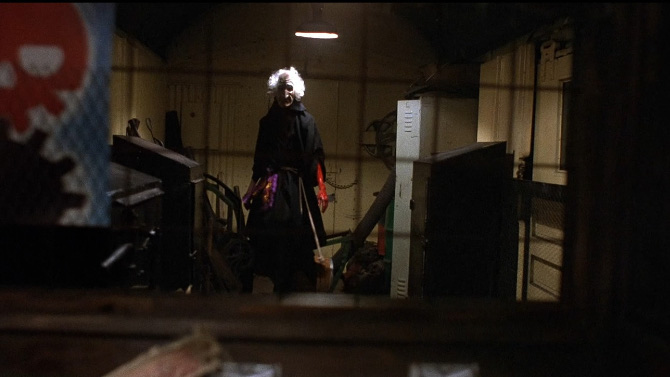
Train Crossing
‘Capitalize’ is the word of the day – and boy was it well conceived. Meaning both ‘to take a chance to gain advantage’ as well as ‘to provide with money’, both definitions speak to today’s motion picture. . . for Terror Train (1980) arrived in theatres just two short years after the seminal slasher movie Halloween (right in the heart of the horror boom), taking a somewhat similar premise to the aforementioned movie while also bringing that film’s star, Jamie Lee Curtis, along for the bumpy ride (talk about trying to ‘capitalize’ on the present cinematic situation. . . and, in the end, they basically doubled its limited 4.2 million dollar budget). A Canadian production (in many ways, Canadians were experts at developing these slasher flicks – think of arguably the first of the sub-genre – Black Christmas, as well as Prom Night, My Bloody Valentine, Happy Birthday to Me. . .), recently I reviewed the big budget 1998 James Bond film Tomorrow Never Dies, directed by Roger Spottiswoode. . . what was he doing eighteen years prior? Directing this low budget horror film (his first ever directorial effort).
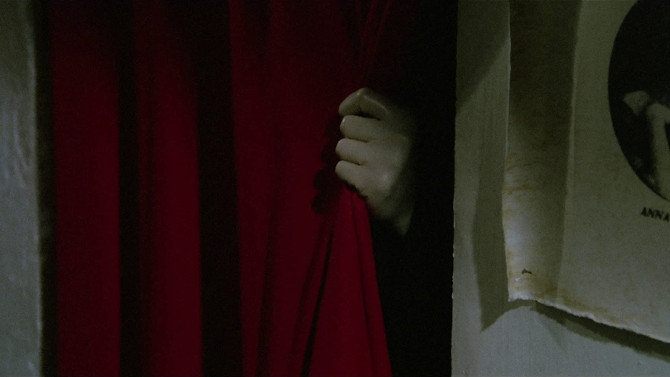
Confusing Killer Titles for $500, Alex
Produced towards the end of the giallo craze, director Antonio Bido’s 1977 film, which had different titles for the major markets in which it played. . . in Italy – The Cat with the Jade Eyes (good luck figuring out how this ties to the movie in any way), in the UK – The Cat’s Victims (again, loose ties at best), in the U.S. – Watch Me When I Kill (again, not very accurate), in France – Terror in the Lagoon (not sure where the Creature was. . . or the lagoon, for that matter), in Germany – The Vote of Death (finally one that may just make sense), takes the prototypical giallo themes and flips them on their head. Not psycho sexually driven or overly graphic in its violence, the story follows a guarded dancer, Mara (Paola Tedesco), who just seems to draw people in. Performing different routines on the stage of a nightclub (keep those minds out of the gutter everyone, think tango rather than striptease), Mara finds so-called filmmakers pestering her to join their project (hoping to get her into bed as well), a needy dance partner who is always keeping an eye on her, and her former fling, Lukas (Corrado Pani), coming around to rekindle their sporadic romance.
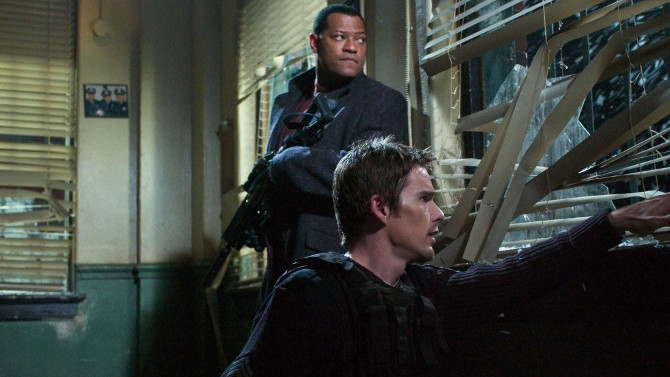
Aggravated Assault
A remake, especially of a classic (or cult classic) is tricky. You’ll have a tough time winning over the purists – too similar and it is considered a cheap rehash. . . too different and it is looked upon as not paying proper tribute to the original, meaning that you’ve really got a lose/lose situation (in regards to your core audience). One remake that deserves a second look is the 2005 Jean-François Richet (Mesrine Part 1 & 2; Blood Father) action crime film Assault on Precinct 13. Based upon the John Carpenter film of the same name (the filmmaker carrying with him a group of diehard fans that are hard to please), James DeMonaco (the scribe of The Purge franchise) takes over the gargantuan task of modernizing this iconic cult classic. Rooted in a very similar situation (but changing enough to make it feel quite fresh), as in its predecessor, the Precinct is closing in one short day – in this case, on January 1st.
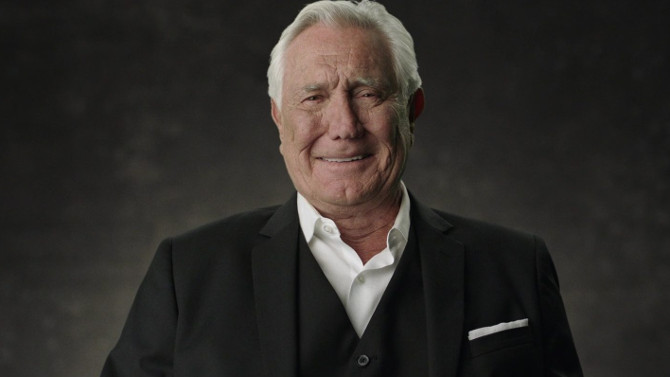
Shaken and Stirred
When it comes to On Her Majesty’s Secret Service, there may not be another James Bond film that is more divisive amongst fans. Tending to have people falling on either the love it or hate it side. . . there are good arguments to be made in both camps – yet that is not something to be settled here today. No matter where you fall within this conversation, if you’re a Bond fan, the 2017 documentary Becoming Bond, written, directed and produced by Josh Greenbaum, is for you. As playful as any Bond film (and perhaps as implausible), George Lazenby (star of On Her Majesty’s Secret Service – and the only actor to play 007 just once) narrates us through his fascinating life (including when Sean Connery decided to step away from the character. . . only to return once more after Lazenby decided not to put his John Hancock onto a seven film deal that included a one million dollar signing bonus – preferring freedom and a life over fame and fortune).
